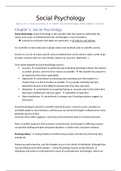Samenvatting
Social Psychology - Summary
- Instelling
- Universiteit Leiden (UL)
This is an English summary of the "Social Psychology" book for the first year course Social and Organizational Psychology. It contains the relevant chapters for the exam in 2018, chapter 1 to 10.
[Meer zien]





